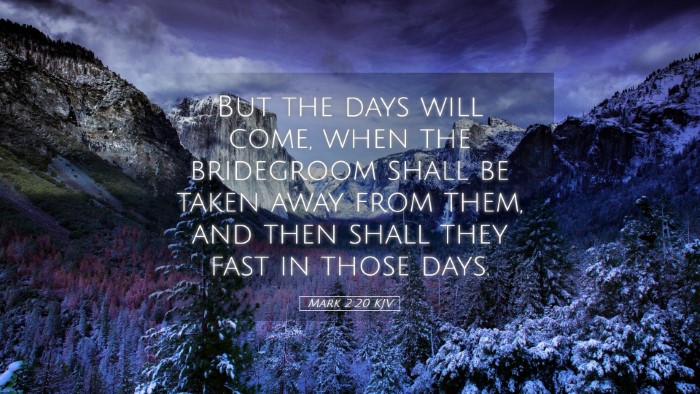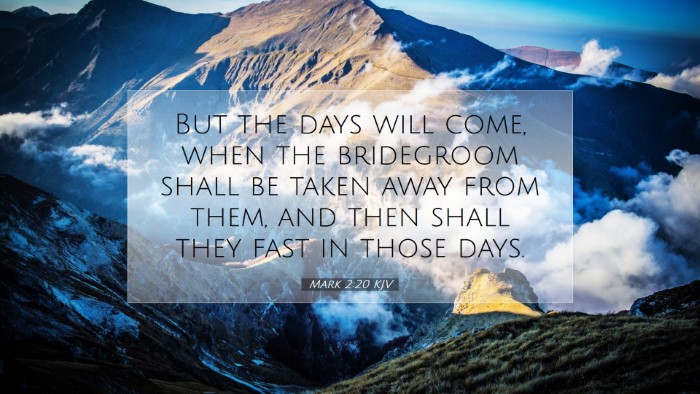Old Testament
Genesis Exodus Leviticus Numbers Deuteronomy Joshua Judges Ruth 1 Samuel 2 Samuel 1 Kings 2 Kings 1 Chronicles 2 Chronicles Ezra Nehemiah Esther Job Psalms Proverbs Ecclesiastes Song of Solomon Isaiah Jeremiah Lamentations Ezekiel Daniel Hosea Joel Amos Obadiah Jonah Micah Nahum Habakkuk Zephaniah Haggai Zechariah MalachiMark 2:20
Mark 2:20 KJV
But the days will come, when the bridegroom shall be taken away from them, and then shall they fast in those days.
Mark 2:20 Bible Commentary
Bible Commentary on Mark 2:20
Mark 2:20 states: "But the days will come when the bridegroom shall be taken away from them, and then shall they fast in those days."
Contextual Background
This verse is nestled within a passage where Jesus discusses fasting in the context of His ministry. The disciples of John the Baptist question Jesus about why His followers do not fast, contrasting their practice with that of the Pharisees. Here, Jesus provides a profound insight into His identity and the nature of His mission.
Insights from Commentators
Matthew Henry
Matthew Henry emphasizes the significance of the 'bridegroom' metaphor. He explains that Jesus identifies himself as the bridegroom, which suggests a deep, joyous relationship between Him and His followers. Henry notes that the absence of the bridegroom symbolizes a time of mourning and spiritual longing, highlighting the transition from His earthly ministry to a period where His followers would feel His absence profoundly.
Albert Barnes
Albert Barnes delves into the eschatological implications of this verse. He makes it clear that the reference to fasting is not merely a practice but a response to a significant absence that implies the need for spiritual preparedness. Barnes posits that fasting expresses sorrow and supplication, which will be necessary when Jesus is no longer physically present, indicating a future end to His earthly ministry and the beginning of the Church age, where His followers must navigate their faith without His physical presence.
Adam Clarke
Adam Clarke offers a compelling view on the metaphor of fasting in this context. He argues that fasting represents a deep yearning for God’s presence, a theme that resonates throughout Christian life. Clarke highlights that while Jesus is with them, joy is paramount, yet His departure will usher in a period where fasting becomes not only appropriate but necessary as believers seek closeness with God amidst their longing for Christ’s return.
Theological Implications
The proclamation that "the bridegroom shall be taken away" carries rich theological significance. It presages the crucifixion, a central event that not only marks the end of His earthly ministry but also reveals the depth of His sacrificial love. This theological lens informs our understanding of Christian grief, spiritual hunger, and the call to maintain a robust prayer life even in times of desolation.
- Grief and Longing: The notion of the bridegroom's absence invites reflection on human emotions, especially during times of loss. For the early disciples and believers, the reality of Jesus' physical absence created a space where fasting was seen as a means to cultivate spiritual depth.
- Preparation for the Church Age: The text foreshadows the need for the early Church to rely on prayer and fasting as they faced persecution and challenges post-resurrection. It reinforces the idea that despite His absence, Christ's presence remains through the Holy Spirit.
- Expectation of Christ’s Return: The commentary encourages believers to live in anticipation of Christ's second coming, reminding them that, much like the disciples' experience after His ascension, we are to fast in a spiritual sense, longing for the fulfillment of God’s kingdom.
Practical Applications
The implications of this verse extend beyond mere theological discourse; it invites practical engagements with the text.
- Fasting as a Discipline: Believers are encouraged to engage in fasting not solely as an act of deprivation but as a means to center their focus on Christ, ensuring that their relationship with Him is prioritized above all.
- Creating a Culture of Anticipation: Churches can foster an environment where fasting and prayer are embraced as regular and vital expressions of faith, encouraging believers to seek God earnestly during times of both joy and mourning.
- Community Support: Understanding that grief and longing are shared experiences, churches can develop ministries that cater to individuals seeking solace and connection through shared spiritual disciplines during challenging times.
Conclusion
Mark 2:20 is a pivotal verse that challenges believers to understand the nuances of joy, loss, and anticipation in their walk with Christ. As pastors, students, theologians, and Bible scholars delve into this text, they are invited to explore the profound truth of Christ's presence and absence, the implications of fasting, and the ongoing call to maintain a relationship with God characterized by both joy in His presence and yearning in His absence.


